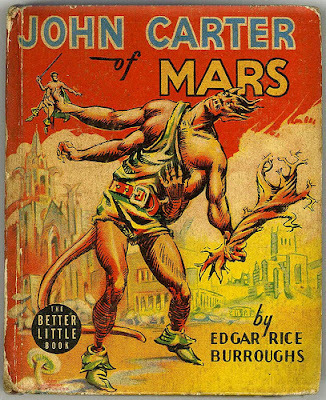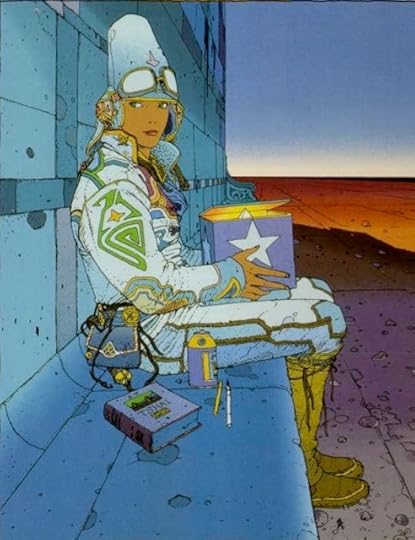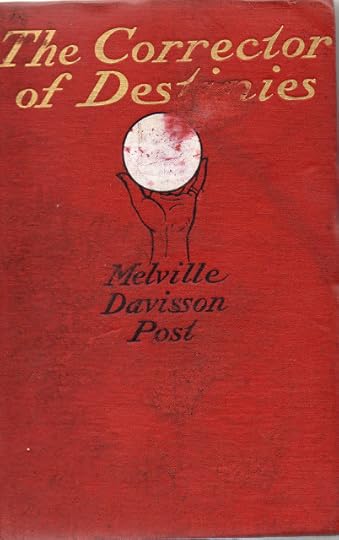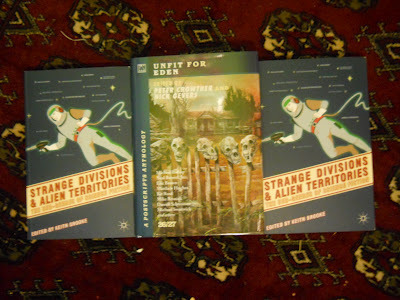Michael Swanwick's Blog, page 198
March 14, 2012
Writing In My Sleep
.

Today was such a perfect day that I did no useful work at all. Mostly I wandered about outside, enjoying the spring weather. But I also took in John Carter, the movie that Disney in its wisdom decided shouldn't have the words of Mars appended to its title. Synoptic review: If you liked the books when you were young, you'll enjoy it greatly. But if this isn't your sort of thing, then I don't expect you'll give it a try.
And I was writing in my sleep again . . .
I've written in my sleep before, but this time was different. This time, and for the first time ever, I wrote poetry. Well, doggerel. I make no claim as to its merit, other than the inherent interest of a piece written without the intervention of consciousness. The title, however, is a retrofit because my sleeping self did not bother to provide one.
*

Today was such a perfect day that I did no useful work at all. Mostly I wandered about outside, enjoying the spring weather. But I also took in John Carter, the movie that Disney in its wisdom decided shouldn't have the words of Mars appended to its title. Synoptic review: If you liked the books when you were young, you'll enjoy it greatly. But if this isn't your sort of thing, then I don't expect you'll give it a try.
And I was writing in my sleep again . . .
I've written in my sleep before, but this time was different. This time, and for the first time ever, I wrote poetry. Well, doggerel. I make no claim as to its merit, other than the inherent interest of a piece written without the intervention of consciousness. The title, however, is a retrofit because my sleeping self did not bother to provide one.
Joyce Kilmer Updated
I think that I shall never see
A poem lovely as a tree
A tree whose hungry mouth is pressed
Against the earth's sweet-flowing breasts
With limbs lopped off by power lines
And stapled posters threatening fines
For wanderers who trespass here
And at its feet crushed cans of beer
Poems are made by fools like me
But modern life defiles a tree
*
Published on March 14, 2012 18:21
March 13, 2012
Looking Back At The Future
.
This was my childhood. My father subscribed to both Popular Science and Mechanix Illustrated , and I used to go through his stacks of back issues looking for the "future in space" articles. This one issue, from January 1956, had two articles by Willey Ley, another two by G. Harry Stine, and others by writers less well remembered. How I loved this stuff! And the future it promised too.
This is how the future looked to be, from Ley's article Here's When We'll Do It:
1957: First unmanned artificial satellite.
1958: First permanent unmanned artificial satellite.
1959/60: Several additional artificial satellites for specialized purposes, including the first animals in space.
1965: Permanent television relay satellites in space. First manned rocket orbits Earth a dozen times.
1967/68: Construction of several manned rockets.
1969/70: Piloted rocket ships carry components into Earth orbit and build space station.
1970/72: Drone rockets orbit the Moon and Venus. No probe is necessary for Mars, because an Earth-orbital telescope has already snooped out its secrets.
1973: First trip around the Moon without landing.
1975: First expedition to the Moon, involving at least three ships.
1977: First expedition to another world, probably the asteroid Eros.
1980/85: Manned expeditions to Mars and Venus.
This is how the future was to be, with the caveat that if an effective nuclear rocket engine were successfully designed and built, everything after the space station would happen a whole lot faster. And my Dad was one of the engineers who were making it happen. I'm still proud of that.
Ley was spot-on about the date of the first artificial satellite, incidentally. He just didn't think that it would be the Russians who launched it.
*

This was my childhood. My father subscribed to both Popular Science and Mechanix Illustrated , and I used to go through his stacks of back issues looking for the "future in space" articles. This one issue, from January 1956, had two articles by Willey Ley, another two by G. Harry Stine, and others by writers less well remembered. How I loved this stuff! And the future it promised too.
This is how the future looked to be, from Ley's article Here's When We'll Do It:
1957: First unmanned artificial satellite.
1958: First permanent unmanned artificial satellite.
1959/60: Several additional artificial satellites for specialized purposes, including the first animals in space.
1965: Permanent television relay satellites in space. First manned rocket orbits Earth a dozen times.
1967/68: Construction of several manned rockets.
1969/70: Piloted rocket ships carry components into Earth orbit and build space station.
1970/72: Drone rockets orbit the Moon and Venus. No probe is necessary for Mars, because an Earth-orbital telescope has already snooped out its secrets.
1973: First trip around the Moon without landing.
1975: First expedition to the Moon, involving at least three ships.
1977: First expedition to another world, probably the asteroid Eros.
1980/85: Manned expeditions to Mars and Venus.
This is how the future was to be, with the caveat that if an effective nuclear rocket engine were successfully designed and built, everything after the space station would happen a whole lot faster. And my Dad was one of the engineers who were making it happen. I'm still proud of that.
Ley was spot-on about the date of the first artificial satellite, incidentally. He just didn't think that it would be the Russians who launched it.
*
Published on March 13, 2012 09:14
March 12, 2012
Keep Watching The Stars!
.

Jean Giraud, the artist best known as Moebius, died the other day. He was 73.
I only met Giraud once, at a gallery opening for a show of his art, but he impressed me greatly. We had a brief chat about spirituality and how much easier it is to write a story with a positive message than one with a negative one. He was serious, open, without affectation.
At the same opening, I was present when Gardner Dozois, then editor of Isaac Asimov's Science Fiction Magazine , told Giraud he'd love to commission some magazine covers from him. "Unfortunately, we pay in peanut shells and stale popcorn," he said. But Giraud assured Gardner that he'd be willing to work below his usual pay level because he wanted to break into the book cover market.
Alas, though he tried mightily, Gardner couldn't get the art department to go along. The art was too colorful, too inventive, too distinctive. It didn't look like everything else. I had a novel serialization coming up in Asimov's at that time, so there's a slight chance that in an alternate universe I have a Moebius cover in my past. And an even greater one that Gardner that used the cover as a lure to get something spectacular from Gene Wolfe or Ursula K. Le Guin. The man is cunning.
Now Moebius has left the building. Travel well, Monsieur Giraud. May the world you find yourself in be as bright and inventive and involving as the ones you invented for us.
And on a lighter note . . .
I come up with easy money-making ideas all the time. Unfortunately, I'm not a money-maker. So I might as well pass this one on to you:
You know those ugly jackets that emergency response personnel wear a crime scenes with POLICE or FBI or MORGUE or whatever in block letters on the back? I bet one of those labeled PERP would sell really well.
Better than the one labeled VIC, anyway.
Above: Star Watcher. Note the book titled Tshai by "J.V." Also the little man by her foot. I have a serigraph of this hanging in my living room. It doesn't grow old.
*

Jean Giraud, the artist best known as Moebius, died the other day. He was 73.
I only met Giraud once, at a gallery opening for a show of his art, but he impressed me greatly. We had a brief chat about spirituality and how much easier it is to write a story with a positive message than one with a negative one. He was serious, open, without affectation.
At the same opening, I was present when Gardner Dozois, then editor of Isaac Asimov's Science Fiction Magazine , told Giraud he'd love to commission some magazine covers from him. "Unfortunately, we pay in peanut shells and stale popcorn," he said. But Giraud assured Gardner that he'd be willing to work below his usual pay level because he wanted to break into the book cover market.
Alas, though he tried mightily, Gardner couldn't get the art department to go along. The art was too colorful, too inventive, too distinctive. It didn't look like everything else. I had a novel serialization coming up in Asimov's at that time, so there's a slight chance that in an alternate universe I have a Moebius cover in my past. And an even greater one that Gardner that used the cover as a lure to get something spectacular from Gene Wolfe or Ursula K. Le Guin. The man is cunning.
Now Moebius has left the building. Travel well, Monsieur Giraud. May the world you find yourself in be as bright and inventive and involving as the ones you invented for us.
And on a lighter note . . .
I come up with easy money-making ideas all the time. Unfortunately, I'm not a money-maker. So I might as well pass this one on to you:
You know those ugly jackets that emergency response personnel wear a crime scenes with POLICE or FBI or MORGUE or whatever in block letters on the back? I bet one of those labeled PERP would sell really well.
Better than the one labeled VIC, anyway.
Above: Star Watcher. Note the book titled Tshai by "J.V." Also the little man by her foot. I have a serigraph of this hanging in my living room. It doesn't grow old.
*
Published on March 12, 2012 07:18
March 9, 2012
Mamas, Don't Let Your Babies Grow Up To Be Writers
.

One of the candidates for vice president of SFWA has a proposal that a new category of member be created -- the Master or Professional category, for those who make a living from my own particular swindle of choice. I won't go into the subtleties of his arguments or the complexity of his proposal. But I will note that his definition of a Master Writer is one who earns at least five thousand dollars a year.
Give thousand dollars. A year.
An attorney who made five thousand dollars a year wouldn't be called a Master Lawyer. A CPO earning that little wouldn't be a Master Accountant. A doctor earning that little would be an abject failure. But if you're a writer, the bar for dazzling success is that low.
It's enough to make my inner catcher in the rye want to stand by the hideous cliff of Publication and shout, "Kids! Turn back! Become carpenters or truck drivers or nurses! Even pizza delivery guys do better than this!"
But of course no writer is ever sensible enough to heed such advice. As one of our number once observed: We're all mad here.
*

One of the candidates for vice president of SFWA has a proposal that a new category of member be created -- the Master or Professional category, for those who make a living from my own particular swindle of choice. I won't go into the subtleties of his arguments or the complexity of his proposal. But I will note that his definition of a Master Writer is one who earns at least five thousand dollars a year.
Give thousand dollars. A year.
An attorney who made five thousand dollars a year wouldn't be called a Master Lawyer. A CPO earning that little wouldn't be a Master Accountant. A doctor earning that little would be an abject failure. But if you're a writer, the bar for dazzling success is that low.
It's enough to make my inner catcher in the rye want to stand by the hideous cliff of Publication and shout, "Kids! Turn back! Become carpenters or truck drivers or nurses! Even pizza delivery guys do better than this!"
But of course no writer is ever sensible enough to heed such advice. As one of our number once observed: We're all mad here.
*
Published on March 09, 2012 01:46
March 8, 2012
Bottom's Dream
.I was watching what I persist in thinking of as Kevin Kline's A Midsummer Night's Dream last night, though of course more properly the movie belongs to director Michael Hoffman, and when I came to the Pyramis and Thisbe play-within-a-play could not help but think of
Hamlet
. There are an infinite number of Hamlets and while many of them are bad, none of them are boring. Hamlet is always worth watching.
In which context, I couldn't help thinking that Pyramis and Thisbe is Shakespeare's demonstration that while theater can be very, very (and sometimes very, very, very) bad, it is inherently gripping. When Thisbe, falsetto voice and inability to act convincingl, and all, comes upon the dead body of her lover, the audience falls silent. It's bad. The script is ludicrous. The actors suck. And yet.
And yet.
Theater is good. Even bad theater is better than no theater at all.
This is Bottom's dream: That inadequate as he is, he might (possibly with the help of un- sub- or supernatural forces) be a part of something true, something enduring.
Which is my dream as well.
*
In which context, I couldn't help thinking that Pyramis and Thisbe is Shakespeare's demonstration that while theater can be very, very (and sometimes very, very, very) bad, it is inherently gripping. When Thisbe, falsetto voice and inability to act convincingl, and all, comes upon the dead body of her lover, the audience falls silent. It's bad. The script is ludicrous. The actors suck. And yet.
And yet.
Theater is good. Even bad theater is better than no theater at all.
This is Bottom's dream: That inadequate as he is, he might (possibly with the help of un- sub- or supernatural forces) be a part of something true, something enduring.
Which is my dream as well.
*
Published on March 08, 2012 00:18
March 7, 2012
A Literary Oddity: The Corrector of Destinies
.

I have been reading The Corrector of Destinies by Melville Davisson Post. It is an odd book indeed, a collection of stories written perhaps a hundred years ago that are very like detective stories but are not detective stories, and even more like mysteries, but only because they're not much like anything else.
Luckily, the stories have a formula, so they're easy to describe. The narrator is Courtland Parks, secretary to the brilliant but frigidly emotionless lawyer Randolph Mason. Clients driven to impoverishment and desperation by the machinations of some unscrupulous fraud or criminal, seek out Mason, hoping against hope that he can restore their fortunes. After (rather perfunctorily) determining that their cause is just, Mason haughtily issues instructions that seem to achieve the exact opposite of what is desired. When he is obeyed, however, he reveals that through a technicality of the law, the deed signed is not valid, the check will not be honored, the will must be overturned. Then, after the grateful client goes away rejoicing, the legal citations are given so that the curious (and judicially literate) may verify the legitimacy of the ploy.
Such legal loopholes, a reader cannot help but think, could equally easily (and far more profitably) be abused. And, indeed, my research determined that the first two volumes of Randolph Mason stories had him advising criminals on how to break the law with impunity. Apparently Post's editor had a few words of good advice to share between volumes two and three.
One of the charms of a mystery story is trying to figure out whodunnit or whydunnit or whatever the mystification is that the writer sets before you. Followed by the satisfaction of admiring his or her cleverness. But unless you are, as Post was, a lawyer, you have absolutely no chance of guessing the solution before it's presented to you.
And yet the stories have a certain charm. I confess to liking them a lot and for much the same reasons one likes a well-crafted mystery story.
Even though, as I said, I don't think they're really mysteries.
An engaging essay by Joseph Bottum on Mason, with emphasis on his Uncle Abner stories, can be found here.
*

I have been reading The Corrector of Destinies by Melville Davisson Post. It is an odd book indeed, a collection of stories written perhaps a hundred years ago that are very like detective stories but are not detective stories, and even more like mysteries, but only because they're not much like anything else.
Luckily, the stories have a formula, so they're easy to describe. The narrator is Courtland Parks, secretary to the brilliant but frigidly emotionless lawyer Randolph Mason. Clients driven to impoverishment and desperation by the machinations of some unscrupulous fraud or criminal, seek out Mason, hoping against hope that he can restore their fortunes. After (rather perfunctorily) determining that their cause is just, Mason haughtily issues instructions that seem to achieve the exact opposite of what is desired. When he is obeyed, however, he reveals that through a technicality of the law, the deed signed is not valid, the check will not be honored, the will must be overturned. Then, after the grateful client goes away rejoicing, the legal citations are given so that the curious (and judicially literate) may verify the legitimacy of the ploy.
Such legal loopholes, a reader cannot help but think, could equally easily (and far more profitably) be abused. And, indeed, my research determined that the first two volumes of Randolph Mason stories had him advising criminals on how to break the law with impunity. Apparently Post's editor had a few words of good advice to share between volumes two and three.
One of the charms of a mystery story is trying to figure out whodunnit or whydunnit or whatever the mystification is that the writer sets before you. Followed by the satisfaction of admiring his or her cleverness. But unless you are, as Post was, a lawyer, you have absolutely no chance of guessing the solution before it's presented to you.
And yet the stories have a certain charm. I confess to liking them a lot and for much the same reasons one likes a well-crafted mystery story.
Even though, as I said, I don't think they're really mysteries.
An engaging essay by Joseph Bottum on Mason, with emphasis on his Uncle Abner stories, can be found here.
*
Published on March 07, 2012 07:20
March 6, 2012
Bananamanology
.
I posted about this once before, I think. But what the heck. The topic never grows old.
For years, Gardner Dozois and I suffered for being honest men. Periodically, we'd get to reminiscing about the pop culture of our youths and inevitably we'd both enthuse about the artistic genius of the Banana Man. Nobody believed us.
"This is like Hoppity Hooper, isn't it?" Marianne would say. "You guys just made it up."
"No! Really! And Hoppity Hooper is real too!" I'd respond. And wind up looking a lot like Jimmy Stewart in Harvey , another honest man who suffered for the clarity of his vision.
Thank God for the Internet! It took years for the clips to be uploaded, but when they were, they vindicated my youth.
The Internet also proved that the Banana Man I knew was not the original Banana Man. A. Robin (performing above), who created the act, died in 1950. The man who appeared on The Ed Sullivan Show and yearly on Captain Kangaroo was Sam Levine, who bought the act from Robins and did very well by it.
Here's his version:
I'm amazed there aren't Marxist schools of Bananamanology, obsessively analyzing every least nuance of the act. Because it's clearly a leftist critique of Capitalism, magically producing endless amounts of consumer goods and then throwing them all away.
Oh, yeah, and Hoppity Hooper? Also real. As witness:
You can see why nobody believed me.
*
I posted about this once before, I think. But what the heck. The topic never grows old.
For years, Gardner Dozois and I suffered for being honest men. Periodically, we'd get to reminiscing about the pop culture of our youths and inevitably we'd both enthuse about the artistic genius of the Banana Man. Nobody believed us.
"This is like Hoppity Hooper, isn't it?" Marianne would say. "You guys just made it up."
"No! Really! And Hoppity Hooper is real too!" I'd respond. And wind up looking a lot like Jimmy Stewart in Harvey , another honest man who suffered for the clarity of his vision.
Thank God for the Internet! It took years for the clips to be uploaded, but when they were, they vindicated my youth.
The Internet also proved that the Banana Man I knew was not the original Banana Man. A. Robin (performing above), who created the act, died in 1950. The man who appeared on The Ed Sullivan Show and yearly on Captain Kangaroo was Sam Levine, who bought the act from Robins and did very well by it.
Here's his version:
I'm amazed there aren't Marxist schools of Bananamanology, obsessively analyzing every least nuance of the act. Because it's clearly a leftist critique of Capitalism, magically producing endless amounts of consumer goods and then throwing them all away.
Oh, yeah, and Hoppity Hooper? Also real. As witness:
You can see why nobody believed me.
*
Published on March 06, 2012 07:11
March 5, 2012
We're Going To Need A Bigger Telescope
.This is just cool. Scientists have proved the existence of life on Earth by analyzing Earthshine reflected from the Moon. What, you may well ask, is the big deal -- anecdotal evidence ought to be sufficient, right? True enough, for this one planet. But the same techniques, applied to extrasolar planets, may someday prove the existence of life Elsewhere.
We're going to need bigger telescopes than what we've got, though. I'm rooting for an Insanely Large Array on the dark side of the Moon. Or maybe coordinated satellites in distant solar orbit.
You can read the io9 article here.
Meanwhile, of the five hundred some extrasolar planets discovered to date, ten appear not to be linked to any identifiable stars. Which means that nomadic planets may outnumber committed planets in our galaxy two to one. These free agents roam the interstellar darkness, bleak and alone . . . and some of them, conceivably, may harbor life.
The published speculation is that a free agent with a large enough atmosphere could trap sufficient heat from radioactive decay or tectonic activity to provide a friendly environment for microorganisms. Then, when one of these planets blundered into a stellar system, collisions with local bodies could spread life in the most destructive and terrifying manner imaginable.
But that's timid stuff. I like to think there are planets wandering the Great Dark with liquid oceans beneath tremendously thick shells of ice. And in those oceans . . . civilizations. Submarine cities with delicate coral spires and towers, filled with philosophers and minstrels, lovers, fools, librarians, and artists. Wise and peaceful races which not only are unaware of the existence of life elsewhere in the universe but don't even suspect the rest of the universe exists.
I wish them well.
You can read the Spaceref article here.
And because I'm blogging it old-school today . . .
Remember when blogs were just lists of links? I was feeling nostalgic today. Which is why there isn't a picture or a video up top of this post. So, to make it up to you, here's a classic clip of what happens when you add an Alka Seltzer tablet to a sphere of water in zero gravity.
Enjoy.
*
We're going to need bigger telescopes than what we've got, though. I'm rooting for an Insanely Large Array on the dark side of the Moon. Or maybe coordinated satellites in distant solar orbit.
You can read the io9 article here.
Meanwhile, of the five hundred some extrasolar planets discovered to date, ten appear not to be linked to any identifiable stars. Which means that nomadic planets may outnumber committed planets in our galaxy two to one. These free agents roam the interstellar darkness, bleak and alone . . . and some of them, conceivably, may harbor life.
The published speculation is that a free agent with a large enough atmosphere could trap sufficient heat from radioactive decay or tectonic activity to provide a friendly environment for microorganisms. Then, when one of these planets blundered into a stellar system, collisions with local bodies could spread life in the most destructive and terrifying manner imaginable.
But that's timid stuff. I like to think there are planets wandering the Great Dark with liquid oceans beneath tremendously thick shells of ice. And in those oceans . . . civilizations. Submarine cities with delicate coral spires and towers, filled with philosophers and minstrels, lovers, fools, librarians, and artists. Wise and peaceful races which not only are unaware of the existence of life elsewhere in the universe but don't even suspect the rest of the universe exists.
I wish them well.
You can read the Spaceref article here.
And because I'm blogging it old-school today . . .
Remember when blogs were just lists of links? I was feeling nostalgic today. Which is why there isn't a picture or a video up top of this post. So, to make it up to you, here's a classic clip of what happens when you add an Alka Seltzer tablet to a sphere of water in zero gravity.
Enjoy.
*
Published on March 05, 2012 00:45
March 2, 2012
Unifit For Eden
.

Two packages from Great Britain arrived in the mail yesterday. So I have a new story and a book intro fresh out in print. There they are, up above, photographed on my office rug.
The foreword was written for Strange Divisions & Alien Territories: The Sub-Genres of Science Fiction , edited by Keith Brooke. It begins:
Jim Kelly's contribution is titled "Who Owns Cyberpunk?" Which I would hold up for your admiration as being a very good title. My own answer would be "Bruce Sterling, but only because William Gibson doesn't want it." But Jim gives the question a far more thoughtful and incisive examination.
Unfit for Eden is issue 26/27 of Postscripts , the hardcover anthology edited by Peter Crowther and Nick Gevers. I haven't read any of the other stories yet, but they include offerings by Michael Bishop, Eric Brown Matthew Hughes, Kit Reed, Mike Resnick, Darrell Schweitzer, and Neal Barrett, Jr., among others, so it's a pretty safe bet.
My own contribution is "Pushkin the American," which begins:
The story answers the question of how a young American with no knowledge of the Russian language could go on to become one of Russia's greatest writers.
After I wrote "Libertarian Russia," every Russian or Russian-American writer I encountered for the next year demanded to know what I meant by it. I can't imagine what they'll say about this one.
And because you're wondering about this blog's title . . .
The spine of the Postscripts hardcover has a typo. In enormous letters, it reads: UNIFIT FOR EDEN. I'm sure they've already heard from a lot of people about this. But it's nowhere near the typo that L. Sprague de Camp's Rogue Queen suffered when it was reprinted by Bluejay Books as ROUGE QUEEN .
That was one for the ages.
*

Two packages from Great Britain arrived in the mail yesterday. So I have a new story and a book intro fresh out in print. There they are, up above, photographed on my office rug.
The foreword was written for Strange Divisions & Alien Territories: The Sub-Genres of Science Fiction , edited by Keith Brooke. It begins:
Exactly what is a sub-genre? The answer seems so obvious when one poses the question. But a moment's thought undoes all such certainty.This is, pretty obviously, an anthology of non-fiction essays by various writers on the sub-genres of hard science fiction, space opera, fiction about aliens, planetary adventure, time travel, alternate history, apocalyptic and post-apocalyptic fiction, religious SF, topian fictions, cyberpunk, superhuman powers, and posthumanity, written by Gary Gibson, Alastair Reynolds, Justina Robson, Catherine Asaro & Kate Dolan, John Grant, Kristine Kathryn Rusch, James Lovegrove, Adam Roberts, Keith Brooke, James Patrick Kelly, Paul Di Filippo, and Tony Ballantyne, with an afterword by Keith Brooke. Which is to say, people who know what they're talking about.
Jim Kelly's contribution is titled "Who Owns Cyberpunk?" Which I would hold up for your admiration as being a very good title. My own answer would be "Bruce Sterling, but only because William Gibson doesn't want it." But Jim gives the question a far more thoughtful and incisive examination.
Unfit for Eden is issue 26/27 of Postscripts , the hardcover anthology edited by Peter Crowther and Nick Gevers. I haven't read any of the other stories yet, but they include offerings by Michael Bishop, Eric Brown Matthew Hughes, Kit Reed, Mike Resnick, Darrell Schweitzer, and Neal Barrett, Jr., among others, so it's a pretty safe bet.
My own contribution is "Pushkin the American," which begins:
The American, whose name has since been forgotten, came to Yekaterinburg in the Ural Mountains in the year 1817. He was a young man and whatever disgrace had driven him so far from home had been left behind in his native Philadelphia. Somehow he had found work as the secretary of an American industrialist who, along with his wife, was making a tour of Russia with a particular eye to the natural riches of the Urals.
The story answers the question of how a young American with no knowledge of the Russian language could go on to become one of Russia's greatest writers.
After I wrote "Libertarian Russia," every Russian or Russian-American writer I encountered for the next year demanded to know what I meant by it. I can't imagine what they'll say about this one.
And because you're wondering about this blog's title . . .
The spine of the Postscripts hardcover has a typo. In enormous letters, it reads: UNIFIT FOR EDEN. I'm sure they've already heard from a lot of people about this. But it's nowhere near the typo that L. Sprague de Camp's Rogue Queen suffered when it was reprinted by Bluejay Books as ROUGE QUEEN .
That was one for the ages.
*
Published on March 02, 2012 08:52
February 29, 2012
The Geeks Shall Inherit the Earth
.
I'm doing my taxes this week, so I won't have a lot of time for posting. But I'll share with you this film clip I just found. No wonder geek culture is taking over. This is just wonderful.
*
I'm doing my taxes this week, so I won't have a lot of time for posting. But I'll share with you this film clip I just found. No wonder geek culture is taking over. This is just wonderful.
*
Published on February 29, 2012 13:10
Michael Swanwick's Blog
- Michael Swanwick's profile
- 546 followers
Michael Swanwick isn't a Goodreads Author
(yet),
but they
do have a blog,
so here are some recent posts imported from
their feed.



